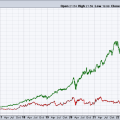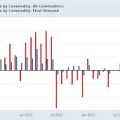Unlock the Editor’s Digest for free
Roula Khalaf, Editor of the FT, selects her favourite stories in this weekly newsletter.
Oil cartel Opec+ is expected to extend current production cuts when it meets on Thursday, as it waits to see how US president-elect Donald Trump imposes oil sanctions on Iran and Venezuela.
The wider Opec group, led by Saudi Arabia and Russia, is currently holding back almost 6mn barrels per day (b/d) from the market, almost 6 per cent of global supply, after making a series of cuts to shore up prices.
In June the group said it would continue to hold the majority of that oil off the market, although it would gradually start unwinding 2.2mn b/d of voluntary cuts from September.
But it has repeatedly postponed pumping out more oil into a falling market. The price of benchmark Brent crude has slid more than 9 per cent since just before its June meeting, and has been trading in a narrow range in recent months. It was up 0.5 per cent at $73.96 a barrel on Wednesday.
Now the cartel wants to gauge the incoming US administration’s impact on global oil supply before making a move, say analysts.
“The prudent course of action would be to continue to watch and wait for another quarter,” said Helima Croft, head of global commodity strategy at RBC Capital Markets.
Under current US President Biden, Iran’s oil exports, almost all of which go to China, have been allowed to flourish. However, Trump has already threatened tariffs on some oil producers and plans to resume his “maximum pressure” policy to bankrupt Iran, seeking to drive its oil exports to zero.
“I think the Trump factor is a big uncertainty,” said Amrita Sen at Energy Aspects. “We don’t know how tariffs will impact the price, but it is generally bearish. And at the same time, we don’t know how hard he’s going to go after Iran. So you’ve got both sides. You need clarity on that before you can act.”
Jorge Leon, a former Opec staffer now at energy consultancy Rystad, said he expected the producer group to “try to play it safe and try to extend production cuts. What I’m hearing is between two and three months.”
On Tuesday, the US said it would start sanctioning specific tankers for exporting Iranian oil, a move that saw oil prices finish about 3 per cent higher on the day.
One analyst, who asked not to be named, said Saudi Arabia was keen not to be perceived as being too eager to fill the gap left, if sanctions on Iranian oil prove to be successful. “They will wait until the market makes it clear that it needs oil,” the analyst predicted.
A further delay will give Opec+ time to watch whether Chinese oil demand picks up as the government tries to stimulate the country’s economy. It will also mean it can postpone its decision until the winter maintenance season for refineries, when oil demand tends to dip. “Chinese demand is material, 100 per cent,” said Sen.
Analysts believe the oil market has priced in a further delay to the unwinding of the production cuts. But there has been speculation that some members of the Opec+ group, particularly Iraq, Kazakhstan and the UAE, are jostling to raise their baseline production quotas after investing to increase capacity.
Those concerns increased after Opec+ last week delayed its meeting for four days, blaming a schedule clash with a meeting of the Gulf Cooperation Council.
“Any time Opec changes a meeting, it fuels concerns in the market that there’s internal discord, whatever logistical excuse Opec members give,” said Raad Alkadiri, of Eurasia Group, who is a longtime Opec watcher. There was pressure on the organisation to “relook” at its output policy in the light of production increases by those three countries, he added.
Both Alkadiri and Croft said compliance with quotas would be a running theme for the oil market, as investors keenly watch to see whether Opec+ members in fact do release more oil.
The UAE is currently pumping 1mn b/d above its quota, while Iraq is over by 350,000 b/d and Kazakhstan by between 50,000 and 100,000 b/d, according to calculations by Jorge Montepeque, a managing director at Onyx Capital, who produces a daily newsletter on the oil market.
“The question might actually turn out to be over the next few months one of Opec discipline as opposed to the formal statements and the formal production policy,” said Eurasia’s Alkadiri.
“If quota discipline diminishes, that’s exactly the same as unwinding cuts. It’s just done in a more surreptitious fashion,” he added.




